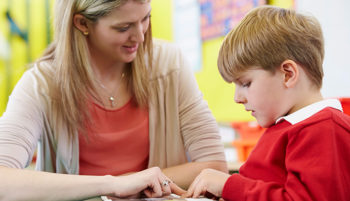Teaching Our Children Executive Functioning Skills
 Teaching Our Children Executive Functioning Skills
Teaching Our Children Executive Functioning Skills
As teachers prepare to support students this coming school year, they are consciously considering how to incorporate the 10 executive functioning skills in daily classroom activities. Summarized below are activities that I use daily in my classroom to shape executive functioning skills to ensue my students are successful with classroom routines and self-management:
Planning and Organization
When teaching reading, my goal is to increase student reading stamina by practicing a sequence of tasks:
- Reading the pictures to connect with the story (characters + setting) to determine what the story is about
- Looking at words to match the vocabulary meanings
- Reading the story with reflective stops or pauses with vocabulary to confirm what the story is about
- Remembering the core elements of a story that include who, what, where, why, and how
- Applying comprehension strategies of sequencing events or retelling key ideas
- Creating visual charts or graphic organizers to help students increase their comprehension skills when reading a story
When teaching math, students have math goals to build their math stamina with tasks:
- Checking for knowledge and understanding before introducing a new math concept or operation
- Giving student choice to work alone or in a small group to complete daily assignments
- Having students review math facts while using the four operations of addition, subtraction, multiplication, and division
- Reviewing math operations with a quick problem that students can solve on their own or work with a math buddy for a solution
- Training peer tutors to assist students who need added assistance to complete assignments
Task Initiation and Flexibility
When working with students, my goal is to evaluate each student’s individual learning needs and adjust individual assignments to build student skills and independent stamina by:
- When introducing a new assignment, I check for understanding and have the students work on their own for approximately 10 minutes.
- As students work individually on their assignment, I walk by each student to observe their ability to complete the assigned activity. If they are stressed or distracted, I break down the assignment to a manageable task.
- As other classmates complete their assignment, I assign a buddy or tutor to assist individual students who are struggling to complete their assignment.
Attention and Self-Control
I use a variety of brain breaks to keep my students motivated and focused on their daily activities. These may include:
- Exercising with videos and songs
- Repeating classroom mantras and call back cheers
- Breaking up the day with movement breaks like recess, lunch break, and morning lap running
- Using fidget toys to help with anxiety and manage stress (at their desk and in a quiet zone / relaxation area)
- Creating a classroom reward system with students working together as a team for special rewards and classroom celebrations
- Having students select their own reading materials that match their interests
- Creating flexible time for students to work together in free play, art activities, or computer game play
Metacognition (e.g. review of what you know and re-dos) and Working Memory (e.g. mental math)
Student metacognition and working memory skills are reinforced when teaching, modeling, and practicing what is being taught in each subject area (with visual tools). Students are able to reflect and assess what they learned by creating and reviewing a proficiency rubric in reading, math, and writing assignments. They can also identify academic and behavior skills that they wish develop or improve by setting a goal to monitor in the next few weeks. Homework assignments and individual projects can be aligned to support practicing these new learning milestones.
Time Management
Each morning my students review the schedule for the day. At the end of each day, they review the class schedule assignments and reflect on their accomplishments and challenges for the day. Through this daily class reflection, students evaluate what their strengths are and decide what to accomplish the next day in class. They also set goals on how they will manage their time to achieve these results. If students have had a very respectful and productive week, they are rewarded with a free play activity at the end of the week.
Perseverance
As our class works together as a team, they learn to support each other in achieving their individual learning goals and cooperatively support each other in these achievements. As a team, the students celebrate each other’s successes and support the learning of individual students as peer tutors. My job as the teacher is to guide these many milestones and celebrate small wins along the way. I adjust the schedule on challenging days to ensure all students feel validated and successful in their learning and self-growth. By integrating executive functioning skills in daily classroom activities, my young students are learning the basic skills required for success in their personal lives and professional careers.
 How to Help Struggling Students Learn
How to Help Struggling Students Learn Teaching Kids How to Be Kind
Teaching Kids How to Be Kind Beyond Backpacks: Setting Up for School Success (Part 2)
Beyond Backpacks: Setting Up for School Success (Part 2) Beyond Backpacks: Setting Up for School Success (Part 1)
Beyond Backpacks: Setting Up for School Success (Part 1)